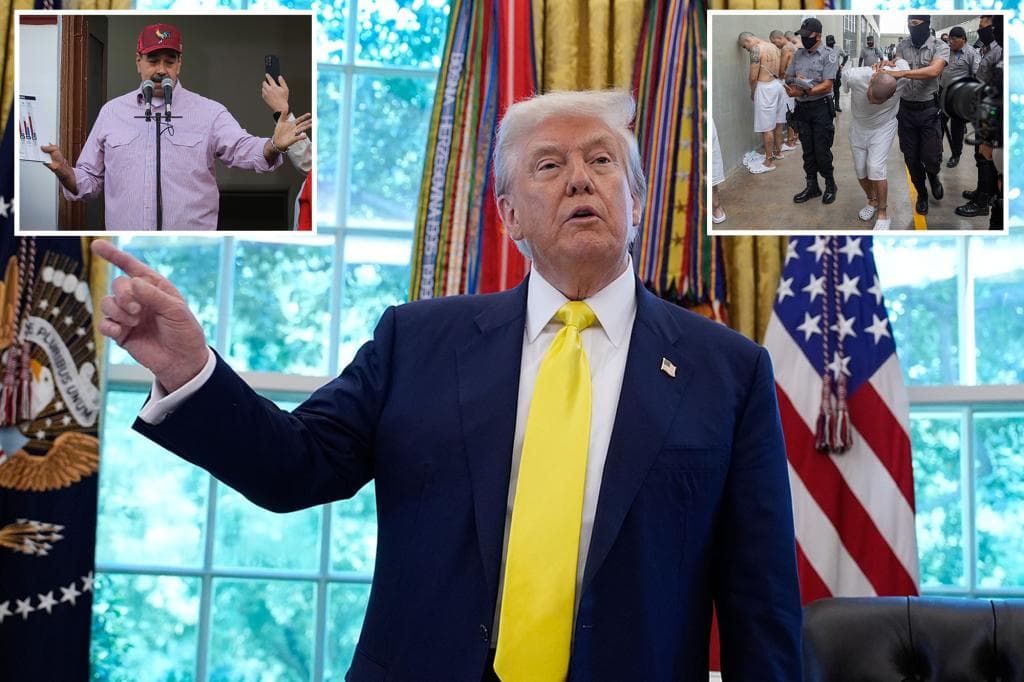Trump Authorizes Military Force Against Drug Cartels Amid $50M Bounty for Maduro
In a significant escalation of U.S. military policy, former President Donald Trump has secretly authorized the armed forces to use force against drug cartels operating in Latin America. This decision comes in the wake of a newly announced $50 million bounty for the capture of Ecuadorian President Nicolás Maduro, who is linked to these criminal organizations. The authorization permits military engagement both on land and at sea, marking a bold and controversial move in the ongoing battle against drug trafficking.
Background & Context
The authorization to use military force against drug cartels is a development that underscores the persistent challenge these organizations pose to U.S. national security and public safety. Historically, cartels have been responsible for a significant influx of illicit drugs into the United States, contributing to a public health crisis characterized by widespread addiction and overdose deaths. In recent years, some of these groups have been classified by U.S. authorities as terrorist organizations, highlighting the severity of their activities and the threat they pose.
Trump"s decision comes at a time of heightened tension between the U.S. and Maduro’s government in Venezuela, with allegations of the latter"s involvement in drug trafficking. The U.S. government has long sought to undermine Maduro"s regime, which it views as illegitimate and corrupt. The $50 million bounty reflects a strategic effort to destabilize the leadership that is perceived as a key player in the drug trade.
Key Developments
Sources close to Trump indicate that the former president is determined to dismantle the cartel operations that are believed to be directly linked to Maduro. This new military directive empowers U.S. forces to take aggressive action against cartel members, potentially leading to direct confrontations in Latin America. The implications of this order are profound, as it not only escalates military involvement but also raises questions about the sovereignty of nations affected by U.S. actions.
While this policy shift aligns with Trump’s hardline stance on crime and immigration, it also risks exacerbating diplomatic relations with countries in the region. Critics of military intervention argue that such actions could lead to unintended consequences, including increased violence and instability within Latin American nations. The authorization has ignited a debate about the appropriate role of U.S. military power in addressing transnational crime.
Broader Impact
The decision to authorize military force against drug cartels may set a precedent for future U.S. interventions in Latin America. Experts warn that this could lead to a cycle of violence and retaliation, as cartels may respond with increased aggression. Moreover, there is a historical context to consider; past U.S. military interventions in the region have often led to long-term instability and resentment among local populations.
Additionally, the move has sparked discussions about the effectiveness of military solutions to drug-related issues. Critics argue that addressing the root causes of drug trafficking—such as poverty, lack of education, and political corruption—should be prioritized over military engagement. As previously reported, President Sheinbaum has asserted Mexico"s sovereignty and rejected the notion of U.S. military presence, indicating a growing resistance to foreign intervention in domestic affairs.
What"s Next
As this situation unfolds, the international community will be closely monitoring the U.S. military"s actions in Latin America. The potential for increased military activity raises urgent questions about the future of U.S.-Latin American relations, particularly in countries like Venezuela and Mexico, where drug cartels operate with relative impunity.
Moreover, with the 2024 presidential election approaching, Trump"s military authorization could become a focal point in the political discourse surrounding national security and drug policy. Observers will be looking for responses from both the Biden administration and other political figures regarding this aggressive stance. The ramifications of this directive may not only affect U.S. foreign policy but could also significantly impact the lives of countless individuals in the regions affected by cartel violence.



![[Video] Gunfire between Iraqi security forces and Sadr militias in Baghdad](/_next/image?url=%2Fapi%2Fimage%2Fthumbnails%2Fthumbnail-1768343508874-4redb-thumbnail.jpg&w=3840&q=75)
